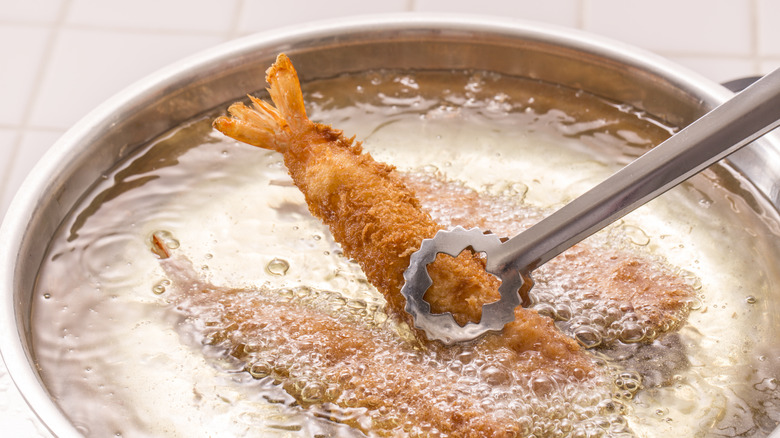Why You Shouldn't Save The Frying Oil After Making Fish
Are you planning a big fish fry for the family, perhaps with some fantastic fresh tilapia, cod, or shrimp for tempura? Chances are good that you'll need to purchase a significant amount of your favorite frying oil to have enough. With the proper batter for fish, just the right cooking temperature, and the perfect timing, you'll have crisp, golden fish in minutes.
Once you do all of that work with your fish, you'll likely have a good amount of oil left over. You can save and reuse most frying oil if it remains in good condition. Serious Eats shares that adding a bit of old frying oil to a new batch could even help improve the outcome, thanks to the change in its hydrophobic state. If you're frying potatoes or fritters, that's typically just fine to do as long as it doesn't break down extensively. That's not the recommendation if you are frying fish, though, especially with delicate-tasting foods. Should you reuse oil you've fried fish in, then?
Saving oil from fish frying isn't ideal
Frying fish is different than just about any other type of food in that a lot of the fish flavor will transfer to the oil during the cooking process. The result is that if you fry a batch of hushpuppies in the same oil as you did the fish itself, those hushpuppies are likely to have a bit of a fishy taste to them, as noted by The Culinary Pro.
What do you do with the oil, then? You can reuse frying oil for the same thing. Frying the same types of foods in it will work just fine as long as the oil remains in good condition, as noted by Food52. To do this, be sure you clean it by pouring it through a fine mesh sieve to remove all particles, and then store it in a tightly sealed jar in a cool and dark location.
If you don't plan to fry fish any time soon, you could try the approach of using ginger as a way to remove the fish taste from the oil. As noted by Umami Days, you can slice ginger thinly, place it into the oil while warming it slowly at the lowest temperature possible, and then let it soak for about 15 minutes before removing the ginger. That helps pull out the fishy taste.

